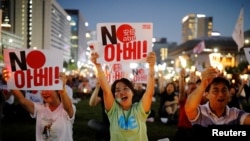South Korea has followed through with a pledge to remove Japan from a preferred list of nations that enjoy fast track trade status, the latest chapter in an escalating diplomatic dispute tied to Japan's 20th century occupation of the Korean peninsula.
Tokyo's removal from a so-called "white list" of nations enjoying minimal trade restrictions means South Korean companies would have to wait as many as 15 days to win approval to export sensitive materials to Japan, compared to five days under the fast track status.
Wednesday's action comes just weeks after Tokyo removed South Korea from its "white list" of trusted trade partners. The decision restricts exports of hi-tech materials to South Korea that are used to produce semiconductors and displays in smartphones and other electronics that serve as the backbone of South Korea’s export-driven economy.
Seoul has filed a complaint with the World Trade Organization over a separate move by Japan to tighten export controls on those materials.
Tokyo's decision to rescind Seoul's fast track trade status are widely seen as retaliation for recent court rulings in South Korea ordering Japanese companies to compensate Koreans who were forced to work in Japanese plants du. The companies have not complied with the rulings, leading some victims to begin the legal process to seize or liquidate the companies’ assets in Korea.
South Koreans are still bitter over Japan's brutal military rule of the Korean peninsula that lasted from 1910 until 1945, when Japan surrendered to Allied forces to end World War II. Hundreds of thousands of Koreans were subjected to numerous atrocities, including the so-called "comfort women" who were forced into sexual slavery in Japanese military brothels.
The issue of compensation for the victims has been an escalating source of friction between Japan and South Korea. Tokyo says the reparations issue was resolved with a 1965 treaty that normalized bilateral relations between the nations. Tokyo has complained that subsequent South Korean governments have not accepted further Japanese apologies and attempts to make amends.




